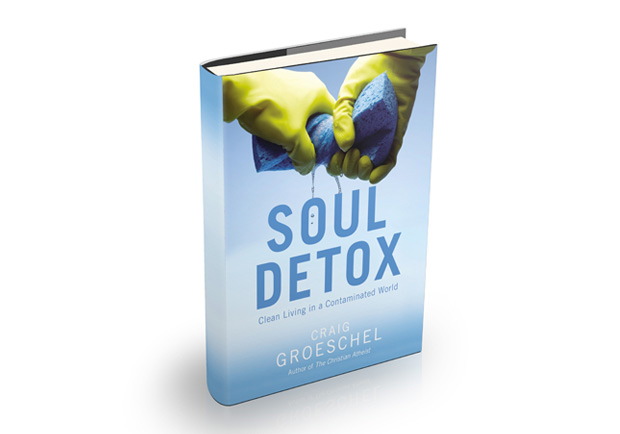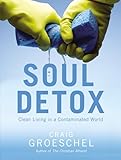One of the things I love about having six kids is watching how they stick up for each other. While they’re more than willing to go ten rounds at home over who gets the last blueberry waffle, at soccer practice or playgroup or, yes, even at church, they defend the Groeschel name with a fierceness that belongs in Braveheart. Growing up, I was the same way with my sister. Even though I could harass her for fun, if someone else messed with her, I’d defend her to the death.
It’s not surprising then that my biggest struggle with bitterness started when my family discovered the awful truth about someone we had trusted in a position of authority over my little sister. I’ve written previously about this very sick man, whom I called Max, but the memory of what he did still haunts me. Most kids in our small town junior high school took at least one class from Max on their journey through the sixth grade. To many kids, Max was a favorite teacher—always cutting up, telling jokes, and handing out easy As. To me, he became the object of the deepest bitterness that I’ve ever known.
Throughout the years, Max developed special relationships with his favorite students. Though none of us were aware of it at the time, we discovered years later that all his favorite students “happened” to be cute, young girls. My little sister, whom I treasured and loved, became one of Max’s victims.
The day I found out that Max had molested my little sister remains one of the most disturbing, surreal times of my life. At first, I didn’t want to believe it. It couldn’t be true. Not Max. Not my sister! Unfortunately, she wasn’t his only victim. Girl after girl recounted similar stories of how Max had sexually abused them. Painfully, we learned that this twisted teacher carefully selected his victims, showered them with presents, and lured them into his trap. The once beloved teacher had created an extensive collection of lives shattered by his unholy desires.
Some studies show that as many as one out of three girls and one in four boys suffer some sort of sexual abuse. Whatever the numbers, this tragedy must crush God’s heart. I know it crushed mine as a brother.
As I’m typing these words, I’m tearing up thinking about what these sweet girls endured. God only knows how many suffered as Max pleasured himself at their expense. I remember trying to absorb the painful truth. How should I respond? Should we track him down? Have him arrested? Beat the life out of him?
Make no mistake; I was furious the moment that I heard about his abuse. But the more I thought about it, my anger blossomed into rage. The seeds of bitterness planted in my heart grew to a full-blown briar patch of revenge. I prayed that Max would suffer eternally in hell, and I vowed to make him suffer on earth before facing God’s judgment.
My plan for revenge wasn’t necessary. To my bittersweet delight, we found that Max was suffering in a hospital, fighting for his life against a crippling disease, muscular dystrophy. I remember thanking God for his justice in giving Max what he deserved.
Punishing Myself
Most would agree that my bitterness toward Max was justifiable. After what he did to my sister (and his other victims), who could blame me for being angry? No matter how justifiable my feelings were, however, in God’s eyes my self-righteous hatred was just as sinful as Max’s crime. Even writing that statement all these years later remains difficult—how could my desire for justice be considered as sinful as this monster’s lustful actions? The vast majority of people would agree that my hate and judgmental rage were more than justified.
In the course of time, however, I learned that bitterness never draws us closer to God. Bitterness is a nonproductive, toxic emotion, usually resulting from resentment over unmet needs. I was angry that my family could not hurt Max in return for what he stole from my sister. My unmet need was not only for justice but for retribution; I wanted him to suffer, to live with the awful awareness of the kind of man he was and what he did.
Instead, I was punishing no one but myself and those around me who experienced the scalding spillovers of the acid churning inside me. My self-induced misery led only to a chain reaction. Like a master criminal needing support for a big heist, bitterness never works alone. Its insidious partners include jealousy, anger, hatred, disobedience, contempt, gossip, rage, and countless other tag-alongs. The job they’re planning is to rob anyone they can of peace, hope, joy, forgiveness, and mercy. Instead of just inflicting one cut on our souls, bitterness and its gang litter our spiritual path with layers of crushed glass, leaving us to bleed a slow, agonizing death of resentful rage.
God’s Word shows us clearly the dangers of bitterness: “Make every effort to live in peace with everyone and to be holy; without holiness no one will see the Lord. See to it that no one falls short of the grace of God and that no bitter root grows up to cause trouble and defile many” (Heb. 12:14–15, emphasis mine). Though we can’t control the outcome, we’re called to do everything possible to live at peace with others, even those—or especially those—who have hurt us. The problem is that when you’re filled with bitterness, as I was for Max, you don’t want to believe this verse applies to your situation—but it does. The writer to the Hebrews warns us to be on guard for the root of bitterness.
We must watch for it and do everything possible to fight against it. If we’re not careful, if we allow bitterness to take root in our lives, then we might miss God’s grace in our lives.
Craig Groeschel is the founding and senior pastor of LifeChurch.tv.
Excerpted from Soul Detox: Clean Living in a Contaminated World, by Craig Groeschel. Reprinted with permission of Zondervan.










